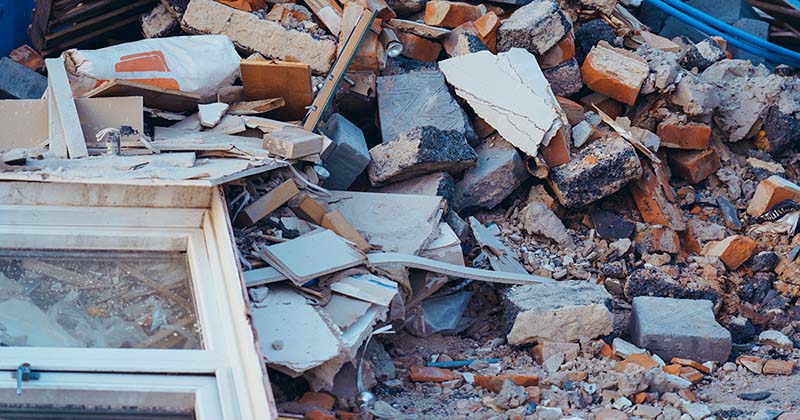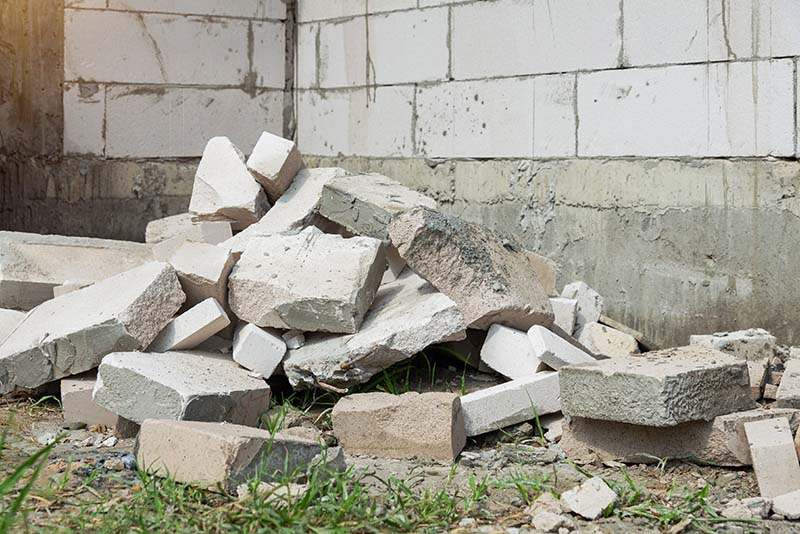The New Rules of DIY Waste Disposal

This year, a significant shift will take place in the way councils across England handle DIY waste disposal. This change, by councils like Kent County Council which we’ll refer to in this blog, marks a pivotal moment for homeowners and DIY enthusiasts. As we navigate these evolving policies, understanding their implications on how you dispose of your waste becomes crucial as you plan and cost any home improvement projects.
Councils are revising their approach to DIY waste, moving towards reducing or even eliminating charges for certain types of waste. This shift is part of a broader effort to address environmental concerns and combat issues like fly-tipping. For those of us who love to roll up our sleeves and dive into home renovation projects, these changes bring both opportunities and challenges. It's now more important than ever to stay informed about your local council's waste disposal guidelines.
Common Free Disposal Items and What They Mean for Your DIY Projects
As councils across England revise their waste disposal policies, a variety of DIY waste items are increasingly being accepted for free at local Household Waste Recycling Centers (HWRCs).
Typical DIY Waste Items Now Accepted for Free
- Building and Construction Materials: Many councils are now accepting common building materials like bricks, breeze blocks, and concrete without charge.
- Ceramic Items: Items such as ceramic tiles, sinks, and toilet fixtures are often included in the list of free disposal items.
- Garden Waste: Some councils also extend free disposal to certain types of garden waste, which can be a boon for landscaping projects.
Navigating the Limits and Restrictions on Free DIY Waste Disposal

While the removal of disposal charges for certain DIY waste items is a welcome change, it's important to understand that there are still limits and restrictions in place. Here is an insight into some of these limitations, using Kent Council's policies as an example, to help you effectively plan your waste disposal. Remember to check your local council’s website in advance as each council sets its own rules and restrictions.
Common Restrictions Across Various Councils
- Frequency of Visits: Many councils impose limits on how often you can visit the recycling centres with DIY waste. For instance, you might be restricted to a certain number of visits per month.
- Quantity of Waste: There are usually caps on the amount of waste you can dispose of for free per visit. This could be measured in terms of the number of items, bags, or overall volume.
- Size of Items: Some councils are restricting the size of single large items. For example, this could be no larger than 200cm length, meaning that some sofa disposal may require you seek alternative methods.
Understanding which items are still chargeable is crucial for effective waste disposal planning. It helps you anticipate any additional costs and manage project budgets. This awareness is key to avoiding surprises when disposing of larger, more complex, or specialised types of waste that fall outside the scope of the new, more lenient policies.
Preparing for Your Trip to the Recycling Centre

Proper preparation before visiting your local recycling centre can make the process of disposing of DIY waste smoother and more efficient. This section offers practical tips to ensure that your waste disposal experience is hassle-free and in compliance with your council's regulations.
Sorting and Organising Your Waste
- Separate Different Types: Sort your waste into different types, such as wood, metal, green waste, etc. This not only speeds up the disposal process but is often a requirement at recycling centres.
- Check Size and Quantity Limits: Ensure that each item or bag of waste adheres to the size and quantity restrictions set by your local council.
Alternatives for Disposing of Large Quantities of DIY Waste
When undertaking substantial home improvement projects, you may find yourself with more DIY waste than your local recycling centre can accept under the free disposal policy. This section explores alternative solutions for managing large quantities of DIY waste, ensuring that you can dispose of your waste responsibly and efficiently.
Options for Large Scale Waste Disposal
- HIPPOBAG: A convenient eco-friendly option, a HIPPOBAG is great for when you don’t want a skip on the driveway or want to reduce the amount of time that unsightly waste is sat on your property.
- Man & Van Services: For a hassle-free option, consider hiring a professional waste removal service like HIPPO’s Man & Van rubbish removal service. We can handle the collection and disposal of large volumes of waste, saving you time and effort.
- Hiring a Skip: A traditional option for large projects, hiring a skip can accommodate a significant amount of waste. It's ideal for projects with a steady stream of debris.
Regional Variations and Policies for Non-Residents at Recycling Centres
Navigating the different waste disposal policies of local councils, especially for non-residents, can be a complex task. Waste disposal policies in the UK can vary significantly from one council to another, influenced by factors such as the types of waste accepted, charges, and specific restrictions based on local regulations and facilities.
For individuals living near the borders of different council areas or planning to use facilities outside their own council area, understanding these regional variations becomes particularly important. For example, some councils, like Kent, require non-residents to pay a fee per visit to use their recycling centres. Additionally, proof of residency might be required in some areas, as certain councils restrict the use of their facilities to local residents only. Therefore, it's essential for individuals to check the specific policies of the council area where they plan to dispose of their waste, ensuring compliance and avoiding any potential inconveniences or additional costs.
Embracing Responsible DIY Waste Disposal
As we've explored throughout this blog, the landscape of DIY waste disposal in the UK is evolving, with many councils adopting more lenient policies while still maintaining certain restrictions. From the free disposal of common DIY waste items to the specific limitations on quantity and frequency, understanding these changes is crucial for anyone embarking on home improvement projects.
Key Takeaways:
- Stay Informed: Regularly check your local council's waste disposal policies, as they can vary significantly across regions and over time.
- Plan Your Disposal Strategy: Whether it's a small DIY project or a large-scale renovation, plan your waste disposal in advance, considering both free and chargeable items.
- Utilise Available Services: For larger projects or when faced with chargeable waste, consider convenient alternatives such as HIPPO's HIPPOBAG, Man & Van, or Skip Hire services.
Simplifying Your Waste Disposal with HIPPO
If you're planning a home renovation or DIY project, explore how HIPPO can simplify your waste disposal. Our range of services is designed to cater to various needs, ensuring that your project runs smoothly.
Contact Us for Assistance: Whether you need advice on the best waste disposal solution for your project or want to book one of our services, our team is here to help. Contact HIPPO today to make your waste disposal process as efficient and environmentally friendly as possible.
Stay Eco-Conscious: Remember, responsible waste disposal is not just about convenience; it's also about caring for our environment. By choosing services like HIPPO, you're contributing to more sustainable waste management practices as we divert more than 95% of waste collected from reaching landfill.
Hassle-free disposal: When you use a HIPPO rubbish removal service, we can handle collecting any amount of waste - reducing the need for you to carry out multiple tip runs and we can collect multiple loads over the course of your DIY project.
We hope this information has been helpful and encourages you to approach your next DIY project with confidence and knowing HIPPO can help you remove waste at each stage of the project with our flexible waste solutions.

